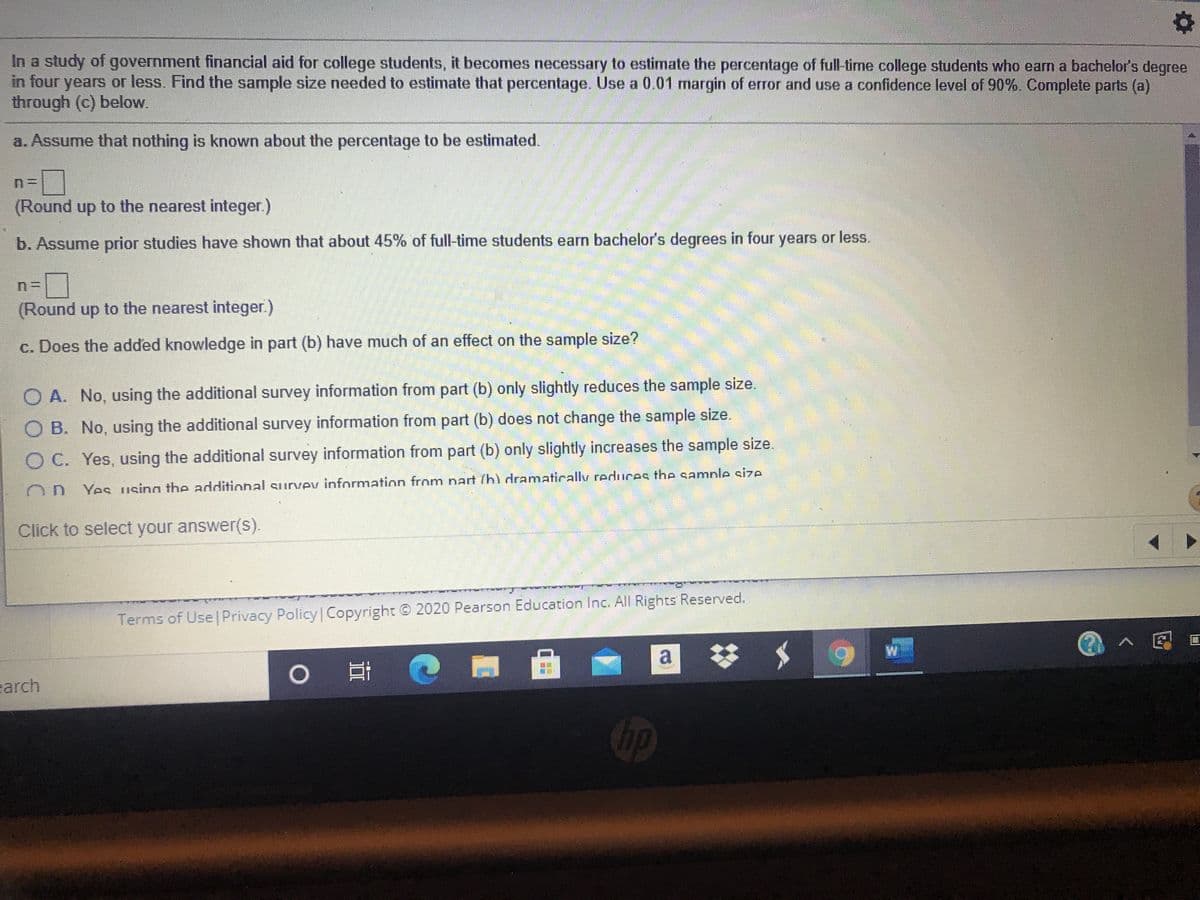In a study of government financial aid for college students, it becomes necessary to estimate the percentage of full-time college students who earn a bachelor's degree in four years or less. Find the sample size needed to estimate that percentage. Use a 0.01 margin of error and use a confidence level of 90%. Complete parts (a) through (c) below. a. Assume that nothing is known about the percentage to be estimated. (Round up to the nearest integer.) b. Assume prior studies have shown that about 45% of full-time students earn bachelor's degrees in four years or less. n= (Round up to the nearest integer.) c. Does the added knowledge in part (b) have much of an effect on the sample size? O A. No, using the additional survey information from part (b) only slightly reduces the sample size. O B. No, using the additional survey information from part (b) does not change the sample size. O C. Yes, using the additional survey information from part (b) only slightly increases the sample size. On YeS using the additional survev information from nart (h) dramatically reduces the samnle size
In a study of government financial aid for college students, it becomes necessary to estimate the percentage of full-time college students who earn a bachelor's degree in four years or less. Find the sample size needed to estimate that percentage. Use a 0.01 margin of error and use a confidence level of 90%. Complete parts (a) through (c) below. a. Assume that nothing is known about the percentage to be estimated. (Round up to the nearest integer.) b. Assume prior studies have shown that about 45% of full-time students earn bachelor's degrees in four years or less. n= (Round up to the nearest integer.) c. Does the added knowledge in part (b) have much of an effect on the sample size? O A. No, using the additional survey information from part (b) only slightly reduces the sample size. O B. No, using the additional survey information from part (b) does not change the sample size. O C. Yes, using the additional survey information from part (b) only slightly increases the sample size. On YeS using the additional survev information from nart (h) dramatically reduces the samnle size
Glencoe Algebra 1, Student Edition, 9780079039897, 0079039898, 2018
18th Edition
ISBN:9780079039897
Author:Carter
Publisher:Carter
Chapter4: Equations Of Linear Functions
Section: Chapter Questions
Problem 8SGR
Related questions
Question

Transcribed Image Text:In a study of government financial aid for college students, it becomes necessary to estimate the percentage of full-time college students who earn a bachelor's degree
in four years or less. Find the sample size needed to estimate that percentage. Use a 0.01 margin of error and use a confidence level of 90%. Complete parts (a)
through (c) below.
a. Assume that nothing is known about the percentage to be estimated.
(Round up to the nearest integer.)
b. Assume prior studies have shown that about 45% of full-time students earn bachelor's degrees in four years or less.
(Round up to the nearest integer.)
c. Does the added knowledge in part (b) have much of an effect on the sample size?
O A. No, using the additional survey information from part (b) only slightly reduces the sample size.
B. No, using the additional survey information from part (b) does not change the sample size.
O C. Yes, using the additional survey information from part (b) only slightly increases the sample size.
Yes usinn the additinnal survev information from nart (h) dramatically reduces the sample size.
Click to select your answer(s).
Terms of Use Privacy Policy| Copyright © 2020 Pearson Education Inc All Rights Reserved.
(? ^E
W
arch
bp
Expert Solution
This question has been solved!
Explore an expertly crafted, step-by-step solution for a thorough understanding of key concepts.
This is a popular solution!
Trending now
This is a popular solution!
Step by step
Solved in 4 steps

Knowledge Booster
Learn more about
Need a deep-dive on the concept behind this application? Look no further. Learn more about this topic, statistics and related others by exploring similar questions and additional content below.Recommended textbooks for you

Glencoe Algebra 1, Student Edition, 9780079039897…
Algebra
ISBN:
9780079039897
Author:
Carter
Publisher:
McGraw Hill

College Algebra (MindTap Course List)
Algebra
ISBN:
9781305652231
Author:
R. David Gustafson, Jeff Hughes
Publisher:
Cengage Learning

Glencoe Algebra 1, Student Edition, 9780079039897…
Algebra
ISBN:
9780079039897
Author:
Carter
Publisher:
McGraw Hill

College Algebra (MindTap Course List)
Algebra
ISBN:
9781305652231
Author:
R. David Gustafson, Jeff Hughes
Publisher:
Cengage Learning